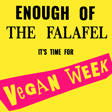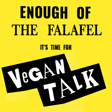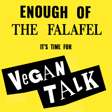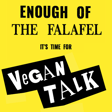
195- Vegan cars & strongmen: It's a soyboy invasion!
Britain's Strongest Man is vegan and can drive home in a Renault with an animal-free interior; welcome to the future! Carlos, Paul & Anthony are here to look at a dozen or so stories from the vegan & animal rights space from the last week or so, and have plenty to chew over.
****************
Enough of the Falafel is a community of people who love keeping on top of the latest news in the world of veganism & animal rights. With the Vegan Week podcast, we aim to keep listeners (& ourselves) informed & up-to-date with the latest developments that affect vegans & non-human animals; giving insight, whilst staying balanced; remaining true to our vegan ethics, whilst constantly seeking to grow & develop.
Each week we look through news stories from the past 7 days in the world of veganism & animal rights.
If you spot any news stories that might catch our fancy, or have an idea for a discussion topic, get in touch via enoughofthefalafel@gmail.com.
*******************
This week's stories:
https://www.bbc.co.uk/sport/equestrian/articles/c3w4g666jl1o
https://www.bbc.co.uk/news/articles/c627gpekvw3o
https://www.bbc.co.uk/news/articles/cpwq40vjw8lo
https://plantbasednews.org/culture/sport/vegan-athlete-britains-strongest-man/
https://www.aber.ac.uk/en/ibers/news/news-article/title-282439-en.html
https://www.independent.co.uk/news/world/europe/zoo-kills-12-baboons-animal-rights-protests-nuremberg-b2798240.html
https://www.peta.org.uk/blog/renault-leather-free/#:~:text=Leading%20auto%20manufacturer%20Renault%20is,our%20Vegan%20Car%20Interior%20Survey.
https://vegnews.com/beyond-meat-name-change
https://www.bbc.co.uk/news/articles/c9dgd8n770zo
https://www.huntsabs.org.uk/cam-and-get-em-hsa-launches-new-camoflage-t-shirt/
https://www.greenqueen.com.hk/three-michelin-star-restaurant-arpege-vegan-plant-based-alain-passard/
https://www.theanimalreader.com/2025/07/27/alaska-approves-controversial-bear-killing-program/
****************
Thanks everyone for listening; give us a rating and drop us a message to say "hi"; it'll make our day!
Carlos, Paul & Ant



